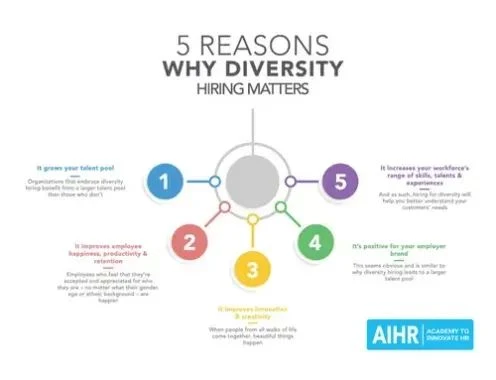- Jobs
- Candidates
- Candidates
- Candidate Services
- Candidate Testimonials
- Employers
- Employers
- Employer Services
- Client Testimonials
- Specialisms
- Executive Interviews
- Podcast
- News & Insights
- News & Insights
- News & Insights
- Events
- About
- Login / Register
Looking for an Employee?
Contact UsLooking for a job?
Social

Katie Insley, Associate Director, explores the second quarter of the year and discusses the uplift in HR opportunities across the Netherlands.
There have of course been significant challenges in some industries, but many have reported growth plans, especially in the second half of the year.
We continue to be in a candidate-led market where the competition for talent is still significant. Businesses must place attention on their employee value proposition in a bid to keep their best people, ensuring they have a working culture and environment that responds to their employees' needs, such as hybrid/flexible working and employee wellbeing initiatives.
We also continue to see an investment in Compensation & Benefits functions, as rewarding employees in a competitive and attractive way remains a key tool to retain top talent.
A good number of organisations have gone through reorganisation activities, and - while this has led to decreases in some traditional HR roles - it has caused an increase in the positions more aligned to the future of HR and where it can add the most value to a business.
These have included roles focused on talent and HR intelligence, where businesses are looking for individuals who are great with data, but who can translate this information into meaningful stories that allow for better decision making.
A focus on HR technology continues, but through the lens of employee experience. How can a business have seamless processes enabled by tech that make an employee’s interactions with HR as easy as possible? This again requires a different skillset, where individuals must not only be great at system optimisation and process improvement but must be able to focus on the user experience, too.
If you’re interested in finding out more about the current recruitment landscape, please reach out to me at: [email protected]
More insights

Female Leadership
Female leadership is probably one of the most talked about topics in multi-national businesses today. We are seeing in the market that companies, as part of growth plans, quote that they are looking to increase female leadership, but are falling short of their target percentages.
This begs the question: are women not being offered equal opportunities, or are they more hesitant to put themselves forward?
EMEA Recruitment held a recent study to see how many men versus women would apply for the same role by looking at the job description. The results show that only 30% of women had applied for the role. The main reason was that women look to tick almost all the boxes required for the position, whereas men will apply if they tick around three to four requirements.
In Europe alone, almost half (46%) of women are employed, while just 35% of those were managers (as of 2021).
Another statistic from Catalyst shows that, among the largest publicly-listed companies in the EU in 2021, only 20% of executives and 8% of CEOs are women.
The key questions
- Is discrimination happening due to women starting families, causing a generational gap in female leadership?
- Do women find it hard to return to leadership roles after taking a career break to raise a family?
- Are certain industries more forthcoming with female leaders than others?
Adapting the “Rooney Rule”
Several companies have now implemented a version of the National Football League’s Rooney Rule, which requires any team hiring a head coach to interview at least one minority candidate.
One business created a requirement that half of the final candidate shortlists for any executive positions must be women; in the last two years, the proportion of women on the executive team has risen from 25% to 40%.
In summary, female leaders can find their strength, express their voice and apply their talents when given these opportunities. They can also shape the conditions for others, supporting and influencing the systems that make the world welcoming to women’s contributions.
The progression of women in the workplace – and in leadership – isn’t just a women’s issue. It is an issue for all of us, so we can build communities in which we tap into the very best from each of us.
Here at EMEA, we provide our clients with relevant market information in a consultative approach - topics are also discussed through our roundtable events with clients. EMEA’s inclusive recruiter approach to each search means we have a deep understanding of the candidate and employer's expectations and needs.
If you’d like to discuss how we can help you build diverse teams, please get in touch with Hannah Mallia.

Are you Investing in a Diverse Workforce?
With DE&I on the agenda for both employers and employees, companies around the world are focusing on developing their diverse recruiting strategies, therefore, good practice of hiring candidates under a process that is bias free is paramount.
Diverse recruitment should be aimed on finding the best possible candidate, regardless of a person’s background, and with equal opportunity given. Having diverse teams can contribute to newer and more varied ideas, resulting in companies being more innovative, creative and, overall, achieving better results.
It's also important to note that diversity in the workplace is not solely focused on business results and performance, but equally on building teams from qualified candidates, irrespective of their age, gender, background, race, religion or sexual orientation - this is long overdue and a step towards true equality in the workplace.
Diverse recruitment has many tangible benefits for performance and productivity, such as a broader range of skillsets, increased language and cultural awareness, and a more varied candidate pool.
“Research from McKinsey & Company shows that the most diverse companies are also some of the most profitable: those in the top quartile for gender diversity on their executive teams were 21% more likely to experience above-average profitability than companies in the fourth quartile. As far as cultural diversity goes, companies in the top quartile were 33% more likely to have higher profitability than their less diverse counterparts.”
https://www.moonworkers.co.uk/blog/5-reasons-why-a-diverse-workforce-is-beneficial?gclid=Cj0KCQjwjvaYBhDlARIsAO8PkE31_jm8-HoPOUQGnEg7sHGlB8KR652Gys0JsIYi8l5k3aim2cxfaQYaAqc8EALw_wcB
When recruiting with a diverse strategy, it’s crucial to measure the metrics of your hiring process. Understanding what your company is aiming to achieve in its recruitment and appealing to a diverse demographic is an effective way to encourage a wide range of applications.
So, how can you encourage such applications?
Tips on diverse recruitment
- Audit your previous vacancies and make the necessary changes that will appear to a wider, more diverse audience - make sure the language used isn’t masculine, feminine or aimed towards a certain qualification level, seek to be more inclusive in the wording so as the vacancy can appeal to candidates with different backgrounds
- Source candidates from different platforms - LinkedIn is one of the best tools to use for sourcing, but do not rely on the same channel to find your diverse candidates, as simply using the same platform, time and time again, can result in a similar talent pool and potentially lack in diversity
- Ensure there are equal opportunities at screening - are the applications you receive anonymous? Are your pre-screening methods blind? Does your ATS system have the technology to flag or filter specific skills and experience? All the above will help you to remain free from bias throughout the recruitment selection process
- Boost your employer branding - displaying your employer brand that naturally values its people and opinions from all backgrounds can be appealing to diverse candidates
- Review your policies – company policies that appeal to a wide range of people demonstrate that diversity is valued and embraced as part of the company culture
Diversity recruitment is based on talent and merit, encompassed with ensuring measures are in place to reduce bias when selecting the right candidate. To ensure you have a strong diverse recruitment strategy, do take the above into consideration.
We have noted a significant increase in payroll vacancies, particularly within the manufacturing and company software development industry over the past three months. These larger, multi-national companies have found such roles more difficult to recruit for, thus turning to external support.
If you require recruitment support for your difficult HR roles, contact our international Associate Director, Katie Insley, on [email protected] or +31 20 241 73 66, who can discuss with you the services she has provided to previous clients and how she can support you with your recruitment needs.

Attracting and Retaining Talent for Growth and Sustainability
What recruitment process should you look at implementing to ensure you are attracting and retaining the right candidates to help grow and sustain your business?
This question could not be more topical than it is today.
Candidates are seeking quality of life from their employment, no longer accepting the working conditions pre-2020; the “great resignation” is not a myth, but a fast-growing worldwide reality that is being fuelled by the choice available on the open market.
The continuous job vacancy growth over the past six years for the Netherlands market has been recorded across all sectors.
"The number of new vacancies subsequently rose by 400,000 to 1.4 million in 2021, reaching the highest level ever recorded. The increase was visible in all occupational classes. This is evident from new labour market figures which have been released by Statistics Netherlands (CBS)." Source: https://www.cbs.nl/en-gb/news/2022/23/more-new-vacancies-in-2021-for-all-occupations
Candidates in the Dutch market know they are in a strong position to demand a great work-life balance, choosing organisations demonstrating strong ethics and morals, inclusive directives, and clear corporate policies.
Many Netherlands based organisations offer attractive packages with education stipends and reduced hours to ensure they attract the best candidates on the market.
It is imperative for organisations to address these fundamentals, not only to attract the right level candidates, but to develop and retain your workforce to ensure growth and future success.
Do you consider your workforce your strongest asset?
Once you have addressed your internal structure to promote your organisation, you should also consider reviewing your hiring processes. Is it robust, efficient, or even fit for purpose?
Efficiency is key. Long recruitment/interview processes with multiple testing and difficult panel scenarios can hold a negative impact on your next generation workforce. It’s important to keep momentum of the interview process to ensure a successful outcome.
We hear from many candidates who have entered a difficult recruitment process and cited they have felt “stressed”, “under pressure”, “unable to deliver” and “de-valued”.
Competitors with quick, fluid decision-making processes are often the most successful in attracting and identifying the right level talent.
This hiring process is not just about an organisation considering the suitability of a candidate, but also the candidate considering the suitability of the organisation.
First impressions
Deliver an opportunity that is going to be well received; first impressions really do count:
- Write a job description that accurately reflects your hiring needs. Make it realistic and competitive, not only within the external market, but also with your internal structure.
- Highlight and promote your organisation’s internal policies.
- Define a robust recruitment process, which covers the process from application/interview to offer within a succinct timeframe.
- Provide clear feedback to all engaged with the process, even those you don’t wish to offer; negative feedback can impact the reputation of your organisation for future hiring.
- Make the hiring process enjoyable for all parties.
Growing your reputation in the market will enhance your credibility and attractiveness to invite and retain the future generation workforce you are seeking.
For more support and guidance in streamlining your hiring process, EMEA Recruitment can provide advice on delivering a robust process. If you are interested in finding out more or have any further questions please reach out to David Harper.

Which Procurement Skills are In Demand?
With Procurement under increased pressure, the skills that are in demand are changing...
As a result of multiple factors, including, but not limited to COVID-19, Procurement departments have experienced significant stress in the last 18 months, and this is predicted to continue, especially within a number of harder hit direct material commodities and those industries subjected to continued oil and gas price fluctuations.
Material availability, price increases, volatility and supply chain disruptions have all come to the fore, creating a perfect storm within Procurement & Supply Chain. This has highlighted the need for Procurement leaders to develop or seek different skillsets. Before this disruption, commercial ability, stakeholder and relationship management, understanding of data and digitization, and cross-functional integration were all desirable skills, but now they are becoming essential for our clients.
To survive in the new market, Procurement leaders need to be predictive and agile. They need to understand trends and integrate cross-functionally now more than ever. The challenges brought mean the skills that Procurement leaders were discussing as highly desirable or skills for the future are skills for now; they are becoming the basic toolkit Procurement professionals need to navigate a new landscape for the coming years.
Our clients are seeking influencers, not the traditional strong negotiator – just being price focused, negotiating tough rebates, liabilities etc. are given hard skills, but they won’t build Procurement’s influence across the wider organisation. In the new landscape, a strong negotiator is someone with the capability to understand internal and external requirements and foster long-term partnerships; it’s an individual who can identify mutual wins while combating risks and protecting profits through market trend planning.
Growth of the global, commercial mindset
When availability of materials is low and competition is high, risk reduction and profit protection isn’t as simple as diversifying the supplier base or last minute alternate sourcing, and this is where the benefits of the new skillset arise.
Being innovative, proactive and anticipating change or challenges is also increasingly important. Being able to identify potential issues before they arise has always been a great benefit, but with the digitalization of businesses as a whole, and swathes of new data and ways to use this becoming available to Procurement leaders, the playing field is definitely not even.
Successful Procurement leaders need to be relationship-focused, data-driven and able to use new technologies to allow their businesses to become more integrated and agile.
For more information on how to upskill your workforce, yourself or simply to understand where your specific industry trends are heading regards talent attraction, please get in touch: [email protected]

Remote Working and Onboarding New Candidates
It’s no secret that this past year has been a challenging one, both on professional and personal levels. With many of our clients now working from home, one question that we do see from most of the candidates that we speak to is, Is the client flexible on remote working?
One trend that certainly became apparent was that, at the beginning of the pandemic a whole year ago, working from home was new for a lot of professionals.
However, we found that many people initially enjoyed this new way of working, especially with the flexibility that it offered, let alone the improved commuting. I think in general, people thought that we would be working from home for a month as a maximum. A year later, here we are, still working from home.
It is safe to say, a lot of people are bored of working from home constantly and would certainly like at least two or three days in the office. There are, however, some companies that have taken this to a whole new level.
Spotify, for example, announced that they are going to introduce a policy for flexible working, so you can work from wherever you choose, whether that be in the office, at home, or presumably by the pool at a nice 5* hotel.
On the other hand, there has been a number of instances where home working has been more efficient for people. As an example, some senior Finance professionals have found that they’re more productive and able to have a better work-life balance; even small things, like taking the dog for a walk at lunch.
For the most part, recruiting has not been the main challenge that our clients have faced during the pandemic. Largely, the challenge comes with onboarding of new employees to the business, with most people starting their new journeys working from home straightaway.
Often, the only time people have met their new work colleagues and superiors has been via a video call. Initially, this might not feel like such as big issue, but simple things such as ensuring access to a system is working correctly or a quick question on process can sometimes feel like it takes forever to get an answer.
For instance, the person you need to speak with may have calls planned all day, they might be away from their desk or you just simply cannot get hold of them. Something which should only take 5 minutes can take up to an hour or more, just because you can’t just go and have that conversation whilst making a coffee or introducing yourself as a new colleague.
On the bright side, however, since the beginning of this year, people have become accustomed to these new ways of working and, even with the news of the vaccine, we’ve found that people are generally more positive that there is light at the end of the tunnel. Not only that, we think we have all become so much better at using and utilising the technology around us, which can only be a good thing moving forward.
If you have just started you new role, or are in need of adding people to your team and have any difficulties or concerns with the points mentioned, then please do feel free to reach out. We have dedicated HR recruiters, Keely Straw in Switzerland and Katie Insley in the Netherlands, who will be more than happy to help.

Candidate Experience Matters in the Recruitment Process
When Jacob Morgan released his book, The Employee Experience Advantage, in 2017, he brought a realisation for many about the importance of employee experience. For many companies it is now the key battle ground to attract and retain top talent.
Graeme Johnson, former HR leader at Virgin Media, speaking in Las Vegas in 2016 perfectly exemplified the cost of a bad candidate experience which for them stood at $5 million per year. We discussed this topic further with Silvina Layani, who advises companies on how to create a fabulous employee experience, and we agreed the following guidelines in regards to the candidate process:-
- The Application: Candidates must understand the process and what to expect.
- Communication throughout the process: Keep in touch with the candidate once they have applied. A ”black-box” process will frustrate, demotivate and detract talented individuals who will share the lack of ”human-touch” with their friends and contacts. That means communication with us, the Recruiter, so that we in turn can communicate with the candidates.
- Interviewing: Interviewers should apply a human-touch rather than simply reading a series of questions like a robot. This is an opportunity for a ”customer conversion” and should be treated with undivided attention. It's important that interviewers sell the benefits of the company and the role.
- Feedback: Providing feedback to candidates, even if not lengthy, will keep the experience positive and help them develop further. This will ensure that all candidates, including those who are not retained, will have a positive experience and might create positive brand advocacy in return.
Add New Saved Search
Add Blog Alert
Sign in to your account
Reset Password


Before you continue to the site
Our website uses cookies, including cookies from our partners, to ensure proper functioning and performance, improve your user experience and analyze traffic. Consult the cookies policy.
You can make your choice below and modify them at any time by going to 'Cookies' in the website footer. Your choices are kept for 6 months.
Customize your cookie choices
Below is a list of cookies on our website. You can accept or refuse the use of cookies by purpose (which implies the acceptance or rejection of all cookies concerned by this purpose). Consult the cookies policy.




You can also use your social account to sign in. First you need to:
Accept Terms & Conditions And Privacy Policy